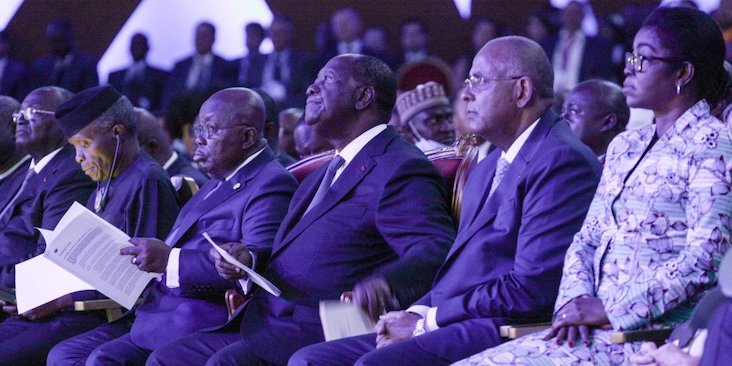[ad_1]
“How do we want to be remembered in history? As simple consumers? Or as transformers of our potential and resources?” With this question, Kate Fotso, the boss of Cameroon’s Telcar Cocoa, sums up the challenge that Africa must take up to build its economic independence. This debate, at the heart of the Africa CEO Forum held in Abidjan, was discussed during a round table on 13 June.
The starting point is clear: Africa’s dependence on the outside world is greater than that of other continents, with 84% of its trade being with the rest of the world. “It is no coincidence that Africa, the continent that trades the least internally, is also the poorest,” pointed out Ghana’s President Nana Akufo-Addo, seeing the development of the African Continental Free Trade Area (AfCFTA) as the only way out for African countries.
A few moments earlier, at the opening ceremony, Côte d’Ivoire’s President Alassane Ouattara said much the same thing. “The current crisis has revealed the vulnerabilities [of globalisation] and marks a calling into question of international trade. This is very disturbing for developing countries,” the Ivorian head of state warned.
Fintech, food, housing
In a difficult context linked to the consequences of the pandemic and the war in Ukraine, Makhtar Diop, managing director of the International Finance Corporation, the World Bank’s private-sector arm, insisted on the need to accelerate cooperation between public and private actors via targeted discussions, highlighting three priority sectors: fintech, food and housing.
Two other tools were highlighted. Nigeria’s vice-president Yemi Osinbajo called for an overhaul of global taxation, particularly for multinationals, to make it more favourable to the continent. The governor of the central bank of Kenya, Patrick Ngugi Njoroge, reminded the audience of the urgent need to invest in human capital, given that “some of the jobs of the future have yet to be invented”.
While the continent has not been able to take party fulling in the latest revolutions and industrial innovations, including nuclear power, Karim Beguir, the head of the Tunisian start-up Instadeep, stressed that “with artificial intelligence, it will have every chance”, as technologies and know-how are freely available. “All it takes is motivated people to train to bring out African talent,” he added.
Understand Africa’s tomorrow… today
We believe that Africa is poorly represented, and badly under-estimated. Beyond the vast opportunity manifest in African markets, we highlight people who make a difference; leaders turning the tide, youth driving change, and an indefatigable business community. That is what we believe will change the continent, and that is what we report on. With hard-hitting investigations, innovative analysis and deep dives into countries and sectors, The Africa Report delivers the insight you need.
[ad_2]
Source link
